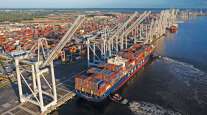Editorial: Infrastructure: Let’s Make A Deal
With the midterm elections settled, now is an excellent time to begin working on legislation to fund the nation’s crumbling infrastructure.
There’s no shortage of ideas to work with. The White House has set a target for spending $1.5 trillion over ten years, but the plan relies on private financing and almost no increase in federal funding. American Trucking Associations has proposed a plan that would generate $340 billion through a new 20-cents-per-gallon fee paid by wholesale fuel sellers. The U.S. Chamber of Commerce and various congressional leaders have offered plans to fund infrastructure with a combination of higher taxes and tolls.
Here’s a modest suggestion: Let’s have a Trump-DeFazio Infrastructure Summit between the White House and incoming Transportation and Infrastructure Committee Chairman Peter DeFazio of Oregon. Perhaps ATA President Chris Spear could even play a role, as he has been a vocal proponent of the need for action on infrastructure. And let’s do it soon, before partisans on both sides become tempted to move away from consensus and toward confrontation.
There is support for getting this done. Republican Senate Majority Leader Mitch McConnell of Kentucky, after a meeting with Democratic Minority Leader Rep. Nancy Pelosi of California, said the one issue where he and Pelosi see hope for a bipartisan agreement is infrastructure.
For his part, DeFazio is hopeful that the White House comes forward with negotiators who will push through Trump’s vision for “real investment and real infrastructure.”
Failure to reach such a deal on infrastructure at the federal level means only one thing: Responsibility for funding roads and bridges and many other things related to the movement of freight will fall to the states.
What that may mean for infrastructure investment is not clear, but the midterm elections provide some clues. Voters in Colorado, Missouri and Utah rejected ballot proposals that would have raised dedicated funding for transportation projects, while voters in California, Louisiana and Connecticut approved measures that preserve existing funds for transportation. In Washington, voters rejected Initiative 1631, which would have imposed a carbon tax on large emitters of greenhouse gases.
These results, while mixed, suggest a way forward. Users of infrastructure can be asked to pay for infrastructure. ATA’s Spear is one who likes to point out that in states that have raised fuel taxes, no politician has been voted out of office for supporting those proposals.
Let’s get started.




